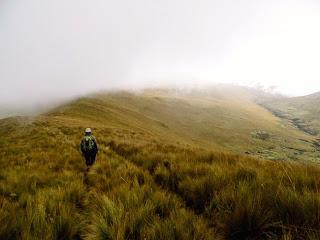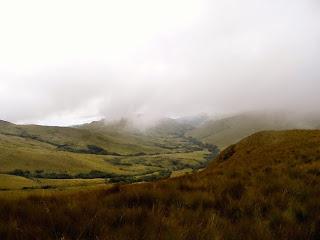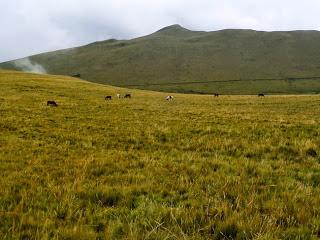 One of the activities I've been looking forward to the most since arriving in Ecuador is trekking in the Andes. Don't get me wrong, I've loved everything else I've done so far, and the good people of Quito have been incredibly accommodating and friendly. On top of that, over the past couple of days, I've had the opportunity to mountain bike down Cotopaxi – a 5897 meter (19,347 ft) volcano – and visit a lake inside a volcanic crater that is simply breathtaking. But I love to hike and climb, and was ready to really stretch my legs in the high country. That opportunity came today, and I was reminded of the old adage "be careful what you wish for."
One of the activities I've been looking forward to the most since arriving in Ecuador is trekking in the Andes. Don't get me wrong, I've loved everything else I've done so far, and the good people of Quito have been incredibly accommodating and friendly. On top of that, over the past couple of days, I've had the opportunity to mountain bike down Cotopaxi – a 5897 meter (19,347 ft) volcano – and visit a lake inside a volcanic crater that is simply breathtaking. But I love to hike and climb, and was ready to really stretch my legs in the high country. That opportunity came today, and I was reminded of the old adage "be careful what you wish for."This morning I checked out of the wonderful Patio Andaluz hotel, and waited for my trekking guides to arrive. They were coming to pick me up for the day's adventure, which included a climb up a 4200 meter (13,779 ft) mountain by the name of Pasochoa, followed by a traverse of the region that would end with a descent into the Pita River Canyon. The trek promised spectacular views and a wonderful nature experience in the Ecuadorian highlands. To say I was excited would be an understatement.
The trek is offered by Tropic, an adventure travel company that can provide just about any Ecuadorian travel experience that you can imagine, including lodge-to-lodge trekking though the mountains. Tropic has a reputation of being incredibly professional, as well as innovative in their approaches to sustainable travel. True to that reputation, my guide showed up exactly on time, introducing himself with a hearty handshake. After introductions were exchanged, I jumped into the large van, where a driver was eager to get underway. I was informed that we would be stopping for some other guests who would be joining us on the hike, and with that we were off into the Quito traffic.
Before long we had stopped to pick up a sales representative from Tropic, as well as six mountain guides who I would have the pleasure of hiking with today. Most of them had not taken this particular trek before, so they were learning the route from Fabian, our lead guide. Once everyone was collected, we were off to start our adventure.
The ride out to the trailhead took about 45 minutes, with the road going from a modern highway, down to a cobblestone trail over the course of that time. At one point, we even had to stop to clear a large tree that had fallen over our route. It took a group effort from all of us to open the route back up, but soon we were speeding along toward our destination once again.
Eventually we hopped out of the van gathered up our gear and box lunches, and started up the trail. In the beginning, it was a path that was very easy to follow, and while it started off a bit steep, it soon leveled out some, giving us a chance to catch our breath along the way. It was also an early opportunity to take in some of the scenery, which was striking, although a bit muted due to low hanging clouds, and the threat of rain.
Soon, the trail turned upwards at a steeper grade once again, and we moved out of the Andes forest and into the marshlands that cover much of the upper sections of the mountains. This proved to be tough going, as the tall grasses that grow on the side of Pasochoa can conceal uneven ground, slick mud, dense roots and a host of other obstacles waiting to trip you up. On top of that, the grass is so thick, and soft, that it almost makes using trekking poles impossible. Not only do the tips of the poles snag on the grass itself, they also sink deep into the blades, sometimes providing no real assistance at all.
It took about three hours to reach the summit of Pasochoa, with the altitude and terrain being the biggest challenges of course. The route, which was often lost in the grass, was a test for the legs and lungs, with a fairly steep angle to the approach ridge. While the altitude certainly left me gasping for air a few times, it was the grass that ultimately proved my biggest nemesis. It would continue to do so throughout the day, but on the last push to the top, I simply gave up using my trekking poles, and resorted to pulling myself upwards using the dense plants as my method of stabilizing myself.
At one point, we moved off of the grass, and onto the rocky summit, and it was far easier moving across the solid ground than it was the unpredictable marsh lands below. Once on the rocks, it was an easy climb to the top, where we took a brief break to enjoy some snacks, and take in the view. Unfortunately, the clouds that has been following us that morning were still around, so there wasn't much to see from the top. Still, on occasion the mists would part briefly to give us a glimpse of the lovely valley below, providing a tantalizing look at what must be an amazing site on a clear day.
Before departing from the summit, two of our guides took a moment to thank the mountain and nature for allowing us to hike to the top. They spoke briefly in Quechua – the native language of the highlands people – and the rest of the group repeated afterwards. The Quechua people have a deep connection with nature, and many of those traditions continue to run deep today.
 After that, we descended from the top of Pasochoa and started the traverse across a mountain ridge towards our next goal. Unfortunately, the tall grass once gain made the descent a challenge, and covered the trail to a degree. At times, I felt like a clumsy ox as I trudged through the moorlands, sometimes stumbling on precarious footing, or sliding across the slightly damp blades of grass. My Andean guides suffered less than I did however, at times making it look effortless as we moved up and down the mountain. I envied their agility on the trail, as it was clear that they had lots of experience in this environment.
After that, we descended from the top of Pasochoa and started the traverse across a mountain ridge towards our next goal. Unfortunately, the tall grass once gain made the descent a challenge, and covered the trail to a degree. At times, I felt like a clumsy ox as I trudged through the moorlands, sometimes stumbling on precarious footing, or sliding across the slightly damp blades of grass. My Andean guides suffered less than I did however, at times making it look effortless as we moved up and down the mountain. I envied their agility on the trail, as it was clear that they had lots of experience in this environment.Our trek continued up and down the route, until we defended across a narrow saddle. At that moment, the skies cleared briefly once again, and the surrounding landscapes were revealed through the clouds. I was once again struck with how lovely the views must be on a clear day, as they were certainly impressive even on our trek, which was ensconced in mist and shadow for most of the hike.
Soon, the clouds closed in once again, and we continued along the trail, which rose up to our second summit of the day. Not nearly as challenging as Pasochoa, it never the less gave us some fine views, including some highlands ponies that were grazing in the lush pastures near by. At this point, it even looked like the skies might clear a bit, and provide us with a bit of sunshine for our afternoon walk. That thought was fleeing however, and soon the gray skies rolled in once again.
We were now more than four hours into the hike, so we decided to descend further down the trail before stopping for some lunch. That was when those dark clouds that had been following us all day decided to make our lives just a little bit tougher. The rains came in a few large, cold drops at first, but it soon started to downpour in steady fashion. We had all slid into our rain gear at that point, and were in doing our best to continue along the trail. By now, the thick grasses where soaking wet, making it even more difficult to navigate through the marshlands.
 I have often said on this blog that there is no such thing as bad weather, just bad gear, and never was that more accurate than today. The heavy rains would soak through any equipment not designed to repel lots of water, and thankfully most of my gear lived up to the challenge. For some reason however, my boots took on water, despite the fact that they have never had issues in the past. The result was wet, cold feet for the latter section of the hike.
I have often said on this blog that there is no such thing as bad weather, just bad gear, and never was that more accurate than today. The heavy rains would soak through any equipment not designed to repel lots of water, and thankfully most of my gear lived up to the challenge. For some reason however, my boots took on water, despite the fact that they have never had issues in the past. The result was wet, cold feet for the latter section of the hike.Eventually, we weren't just getting rained on, but had small pellets of hail thrown at us at well. By this point, even if we were dry, most of us were at least a little cold. We had to climb one last steep ridge, before beginning the final descent to the trails termination point, and while going down made things a lot easier, we still had a good distance to go before we could find respite of the downpour.
Thankfully, we eventually moved out of the marshlands and back into the Andean forest, which helped provide a bit of shelter, as the rain started to lessen some. At that point, we were actually back on a clearly defined trail – the first in hours – which helped make the descent an easier one. Soon, we even left the forests behind, and were trekking through farmland pastures, with our mountain lodge even in sight. Knowing that we were close to a dry shelter from the on-going storm spurred us on.
At long last, we reached the Cotopaxi Pungo mountain lodge, which would be our accommodations for the evening. I had expected to walk into a warm, dry location, that offered few amenities, other than a hot shower, a good meal, and a place to sleep. What I found instead is an amazing hotel nestled in the Andean highlands. As I write this, I can see views of the mountains around us outside the large windows, while lively flames dance in the fireplace. Tranquil music plays out of speakers overhead, as I'm comfortably working away on a couch in the common area. The rooms are even more comfortable, with kingsized beds, a spacious living area complete with a fireplace of its own, and a shower that was even better than I had imagined. In short, this is another wonderful Ecuadoran hotel to add to your list, as it has an impeccable, friendly staff dedicated to keeping their guests happy. And when the skies clear, it offers some of the most incredible views of Cotopaxi that you'll find anywhere.
I'm sure if you've read this entire report of my day, you must be thinking that it was a miserable one. But despite the challenges of the trek, which includes the inclement weather, it was actually a very good hike. Would it have been better without the heavy rain? Of course! But I'm in Ecuador during the rainy season, and poor weather is possible at nearly anytime. I've actually been fortunate that for the most part the weather has been beautiful. But sometimes, the mountains can be difficult, and today was one of those days. I still greatly enjoyed reaching the summit of Pasochoa, and the rest of the trek was also a lot of fun, despite the challenges we faced along the way.
My advice is that if you plan to do this trek during the rainy season (October - April), you should come prepared to deal with rainy weather. I think you'll still find it to be an excellent walk. If you come during the dry season (May - September), the skies will be clearer, but the winds can be extremely high, creating colder conditions. Dress warmly, particularly for your summit push.
Tomorrow, I'll continue trekking with Tropic on another long hike along the Padregal Trail. I'm told that this one is easier than today, with gentle trails through the grasslands once again. If the weather improves, it is also suppose to extremely scenic, with great views of the surrounding mountains. Here's hoping we get some good weather for that hike, as I'd love to get some great photos to share with everyone. I'll keep you posted on that trek too.

